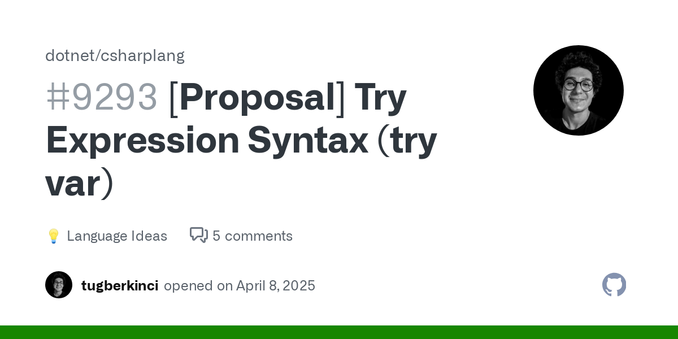| GitHub | https://github.com/Jawvig |
Josh G
- 61 Followers
- 163 Following
- 782 Posts
Hey #dotnet folks, if you're running in a cloud environment, be careful upgrading to the latest version of .NET 8.0.17 before double-checking your forward headers configuration and proxy settings. You may have a misconfigured app, but it's been working up to now.
Boost to let others know. Cheers.
@CriticalSilence I see your points, but personally they don't bother me. On the first one, people can (and do) already use try-catch too much. I don't really think this makes it all that much easier to misuse, but it's subjective and we may have to disagree on that.
On the second point, I view it as similar to the `using` and `namespace` declarations versus their statement equivalents. I will concede that the difference here is that the scope of the application can be foreshortened by a `catch` or `finally`, where `using` and `namespace` declarations are until the end of the method of file respectively. We seem okay with these not having a statement block with indented code, so why should `try` be different?
That last point begs a rebuttal that you could start levelling the same arguments for `if`, `else` and probably other constructs that are followed by statement blocks, and that would clearly be absurd. But I still think `try` is different enough that this would be okay.
`try;`
`var x = 3;`
`catch (Exception e) => _logger.Debug(x);`
`Console.WriteLine(x);`
I don't think there's any IL reason why the variables would need to be scoped to inside a try block. The emitted IL would indicate that the set of instructions protected by the `try;` declaration would comprise everything from there to the `catch` (or `finally` or end of the method / statement block). That shouldn't have any bearing on variable scope. However, getting the variables into the lamda for the `catch` will still be via capture. The `Console.WriteLine(x)` in the example above should still execute fine even though outside of the set of statements protected by the `try;`. No need to declare an uninitialized or dummy variable value outside of the block:
`int x = Int32.MinValue;`
`try {`
`x = 3;`
`}`
`catch (Exception e) { _logger.Debug(x); }`
`Console.WriteLine(x);`

